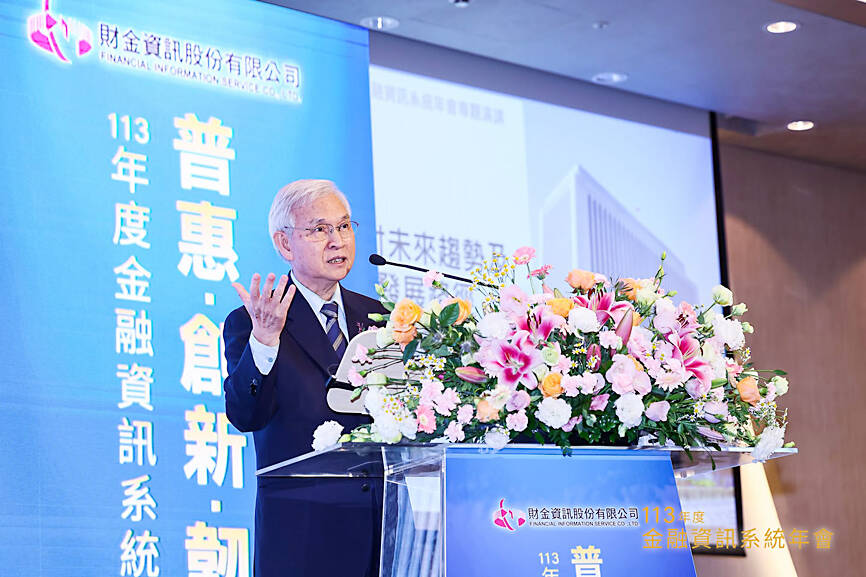Taiwan would remain in the same international network for carrying out cross-border payments and would not be marginalized on the world stage, despite jostling among international powers, central bank Governor Yang Chin-long (楊金龍) said yesterday.
Yang made the remarks during a speech at an annual event organized by Financial Information Service Co (財金資訊), which oversees Taiwan’s banking, payment and settlement systems.
“The US dollar will remain the world’s major cross-border payment tool, given its high liquidity, legality and safe-haven status,” Yang said.

Photo: Chen Mei-ying, Taipei Times
Russia is pushing for a new cross-border payment system and highlighted the issue during a BRICS summit in October.
The existing system — the Society for Worldwide Interbank Financial Telecommunication (SWIFT) — is a cooperative established in 1973 in Belgium and owned by the banks and other member firms that use its service.
SWIFT’s coverage has grown increasingly more extensive and gained a competitive edge, helped by the Internet, Yang said.
Today, about 11,000 financial institutions in more than 200 countries are part of the SWIFT network, making it the backbone of international financial information transmission.
The SWIFT network neither transfers funds, nor is it a banking system. Rather, it sends payment orders between banks using SWIFT codes, he said.
Global transactions amounted to US$271.37 trillion in the first three quarters of this year, with the US dollar being the primary clearing currency, accounting for 47.5 percent, Yang said, citing SWIFT data.
Any uses in contravention of EU or Belgian regulations would be sanctioned after being reported to the SWIFT board. Serious contraveners might be cut off from the system, Yang said.
SWIFT became a means of financial sanctions by Western countries against Russia after its invasion of Ukraine in February 2022, Yang said. Russia was first sanctioned in 2014 after it illegally annexed Crimea and it has since then embarked on a “de-dollarization” campaign against Western countries, the governor said.
The BRICS countries are discussing the creation of a new financial payment platform called the “BRICS Bridge” in a bid to compete with and replace SWIFT, Yang said.
Taiwan’s payment system infrastructure is sound and all banks participate in the SWIFT network, the governor said.

Taiwan Semiconductor Manufacturing Co (TSMC, 台積電) last week recorded an increase in the number of shareholders to the highest in almost eight months, despite its share price falling 3.38 percent from the previous week, Taiwan Stock Exchange data released on Saturday showed. As of Friday, TSMC had 1.88 million shareholders, the most since the week of April 25 and an increase of 31,870 from the previous week, the data showed. The number of shareholders jumped despite a drop of NT$50 (US$1.59), or 3.38 percent, in TSMC’s share price from a week earlier to NT$1,430, as investors took profits from their earlier gains

In a high-security Shenzhen laboratory, Chinese scientists have built what Washington has spent years trying to prevent: a prototype of a machine capable of producing the cutting-edge semiconductor chips that power artificial intelligence (AI), smartphones and weapons central to Western military dominance, Reuters has learned. Completed early this year and undergoing testing, the prototype fills nearly an entire factory floor. It was built by a team of former engineers from Dutch semiconductor giant ASML who reverse-engineered the company’s extreme ultraviolet lithography (EUV) machines, according to two people with knowledge of the project. EUV machines sit at the heart of a technological Cold

TAIWAN VALUE CHAIN: Foxtron is to fully own Luxgen following the transaction and it plans to launch a new electric model, the Foxtron Bria, in Taiwan next year Yulon Motor Co (裕隆汽車) yesterday said that its board of directors approved the disposal of its electric vehicle (EV) unit, Luxgen Motor Co (納智捷汽車), to Foxtron Vehicle Technologies Co (鴻華先進) for NT$787.6 million (US$24.98 million). Foxtron, a half-half joint venture between Yulon affiliate Hua-Chuang Automobile Information Technical Center Co (華創車電) and Hon Hai Precision Industry Co (鴻海精密), expects to wrap up the deal in the first quarter of next year. Foxtron would fully own Luxgen following the transaction, including five car distributing companies, outlets and all employees. The deal is subject to the approval of the Fair Trade Commission, Foxtron said. “Foxtron will be

INFLATION CONSIDERATION: The BOJ governor said that it would ‘keep making appropriate decisions’ and would adjust depending on the economy and prices The Bank of Japan (BOJ) yesterday raised its benchmark interest rate to the highest in 30 years and said more increases are in the pipeline if conditions allow, in a sign of growing conviction that it can attain the stable inflation target it has pursued for more than a decade. Bank of Japan Governor Kazuo Ueda’s policy board increased the rate by 0.2 percentage points to 0.75 percent, in a unanimous decision, the bank said in a statement. The central bank cited the rising likelihood of its economic outlook being realized. The rate change was expected by all 50 economists surveyed by Bloomberg. The